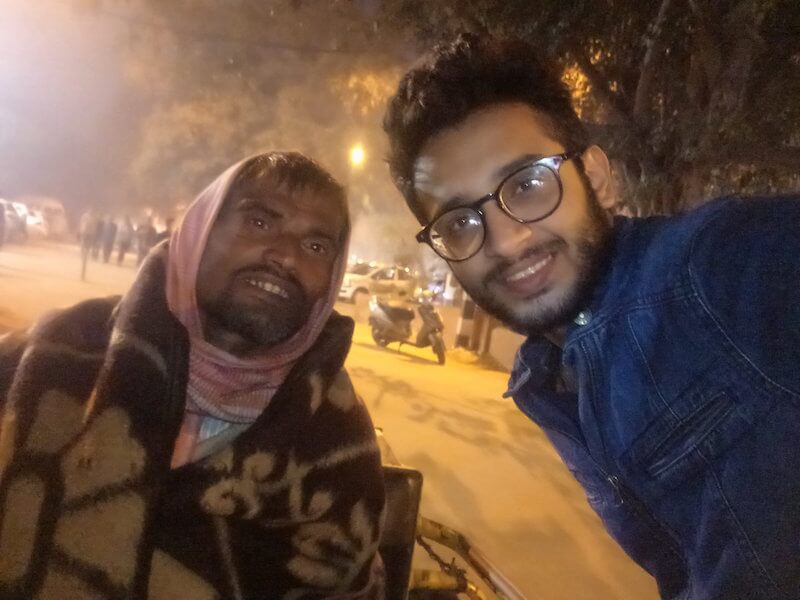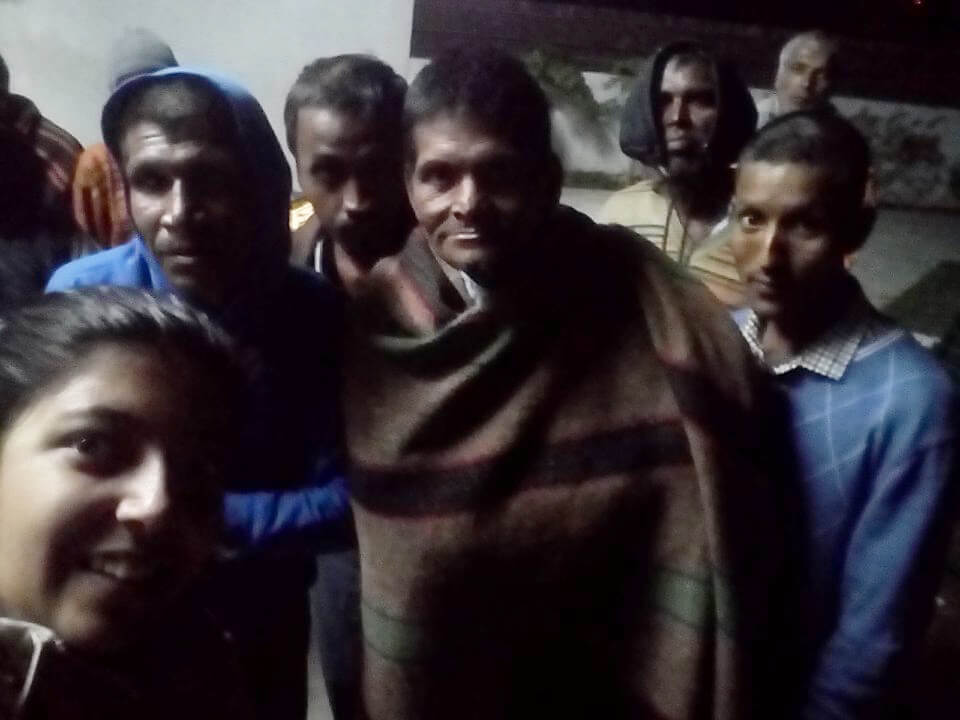“When you see a homeless man on the street and you don’t know him, you most likely will pass him by without a thought. Or, if perhaps you do know him, or you’ve seen him enough to be familiar – you might think to stop and help him out – to give some money or food or offer some assistance. But what would you do if you stop and see that this homeless man is your brother?” —Dr. Hyun Jin P. Moon (Service for Peace)
How would we behave towards people we see every day in need if we saw them as more than just a stranger; what if we saw them as a member of our own family?

GPF India intern, Mehul, visits with once-stranger Narsimha as part of the One Family under God challenge.
Young volunteers with Global Peace Foundation (GPF) in India wanted to ask themselves this simple question and challenged themselves to take to the streets to gain perspective on the vision of “One Family under God.” What they discovered not only changed their hearts and minds, but also provided profound insight on the significance of family bonds in creating a world of peace.
Vidushhi Gandhi, an intern with GPF India, is one many outstanding youth who volunteer their time, energy and passion to encourage community bonding through grassroots service and leadership training in communities throughout India.
This is her story.
How funny it is that we consider our incomparable problems so huge? How do we see the problem of being stuck in traffic or not finding a fairly new dress for the function that you have to attend that evening as the biggest issues for the day? How exactly do we continue to live in a world full of such grave problems with utmost bliss of ignorance?
A single visit to a mercy home made me question all these things and much more to myself. It can be easy to sympathize with the underprivileged but not that easy to empathize with them. And they realize it. Yet, at the mercy home, there is no shortage of hugs, smiles, real laughter or acceptance—genuine acceptance. There wasn’t a single person who did not express his gratitude or happiness when I visited them.
Twelve men live in the mercy home along with three caretakers. All live with some form of disability or were simply too poor to survive, brought to the home by police or people who found them when they had nowhere else to go.

Vidushhi Gandhi with Mercy Home residents and friends.
But there is nothing that can dampen these soulful spirits. Christmas is coming up and Lola and Ashu were more than happy to show me the Christmas tree they had helped to put up with the caretakers the other day. They were so happy and innocent as children and explained to me ever so patiently about how the Christmas tree refused to stand upright for the first few attempts.
Zakir, who had welcomed me so enthusiastically, brought his dog to meet me. He loves his dog, a roadside adopted mix breed called Timmy. His full name is Zakir Hussain. It is because “I am from West Bengal,” he explained, happy knowing the fact that he is sure where he has come from. There are many who don’t even remember where they lived or the family who loved them before tragedy struck.
And then there was Happy who explained that even though he never had any alcohol or smoked any cigarette, he still has some problem in his liver, pointing and showing me the right side of his stomach like a child. Golu snickers from behind when Happy explains that he can’t even have rice now.
It’s a totally different world where people are just happy being alive, getting two meals a day and thanking God profusely for the gift. They don’t start their meal before saying a prayer together, which they repeat after Zakir because as Zakir says, “I am the smartest of them all,” smiling like a naughty child. They don’t leave the dining table until everyone is finished with their meal, which means waiting for Lalu, the oldest of them all to finish slowly chewing his food. I reflect on the miracle it is that many nuclear families today can’t sit down to the same meal in our fast-paced life. “Well, is it that difficult?” That is all I could think when I returned home.
It is not everyday that we get to experience such simplicity of life when we are so caught up in our bubble of privileges. This opportunity will always be cherished in my heart as it was such a grounding experience for me. I am sure that nowhere else could I have experienced such warmth or welcoming nature. These people never let any kind of barriers come in between us. And when it comes to life, all they need is a little love.
The vision of “One Family under God” challenges us to engage in service, charity and giving, in love, relationships and life, differently.
If we are in fact one family, what would we do differently? How much more would we invest in the people around us? How much more would we give to the effort for peace?
The original post appears on Global Peace Foundation. Dr. Hyun Jin Preston Moon is founder and chairman of the Global Peace Foundation.
